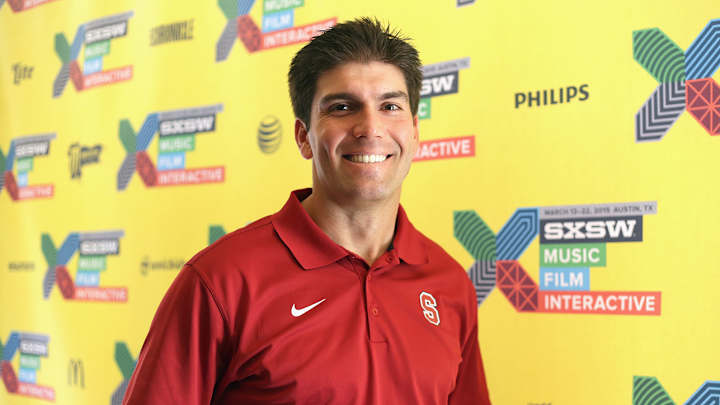STRIVR CEO discusses virtual reality & future of sports technology

Read about the latest sports tech news, innovations, ideas and products that impact players, fans and the sports industry at SportTechie.com.
The SportTechie “Expert Series” asks C-suite professionals, team presidents, league executives, athletic directors and other high-ranking individuals about their latest thoughts and projections on sports technology and how it will impact the industry moving forward.
Derek Belch is the founder and CEO of STRIVR Labs, a virtual reality company that has been at the forefront of helping college and professional football teams and players better prepare for games. It currently counts the likes of Texas Tech, Arkansas, Stanford, the Dallas Cowboys and Arizona Cardinals as clients, among others.
Additionally, STRIVR has continued to work with NFL, NBA, MLB and NHL franchises and their corporate partners around activating at different games using virtual reality. One of the latest examples to elevate the game-day experience came before the Chicago Bears home game on Oct. 2 against the Detroit Lions as STRIVR allowed fans to simulate what it would be like to catch passes and run on the gridiron just like the stars do.
SportTechie: What utilization of STRIVR virtual reality technology in professional or college sports has recently blown you away?
Derek Belch: STRIVR gets a lot of attention for the work we are doing with quarterbacks, but the work we did with Stanford’s kicker, Conrad Ukropina, in 2015 was pretty incredible. [Editor's note: Belch is a former kicker for the Cardinal and earned his master's degree at Stanford.] Here was a kid who, as a backup in two seasons prior to becoming the starter, went 3–6 in his game appearances. Then, in the spring game in 2015, he goes 0 for 3, and coach [David] Shaw is wondering if he can make a kick when it counts. Prior to the 2015 season, we presented an idea to him use our VR system for visualization, and he embraced it and dove right in. I won’t go into specifics about what he did every day, as that’s an advantage he would like to keep to himself, but flash forward to the end of the year and he finishes 18–20, including a huge last-second winner over Notre Dame to keep Stanford in the College Football Playoff conversation. This year, he’s 6-for-6 through the first four games of the season. That’s pretty cool.
ST: If you had to invest in one technology outside of virtual reality that would alter the sports landscape, what would it be and why?
DB: There’s a company called VenueNext—and lots of other companies like them—that’s taking over the fan experience within stadiums and personalizing everything about a fan’s game day experience right in the palm of their hand (via smartphone). Any company that’s transforming the way fans interact with technology at games, and gathering a lot of data about user behavior in the process, is something worth monitoring.

Subscribe to the
SportTechie Newsletter
- NFL storylines to watch for the rest of the season
- The Falcons' new stadium is going green
- Orlando Magic will broadcast game on Facebook Live
ST: If money were no object, what technology would you build or buy to help you do your job better?
DB: My smartphone already does a pretty dang good job keeping me in line . . . and I’m on it too much as it is!
ST: As a sports fan, what sports-related service, app, product, etc., could you not live without and why?
DB: I hate to say this because I thought I would never have the need for constant access to TV outside of the home, but WatchESPN and other streaming services from NBC, FOX, CBS, etc., have been pretty incredible for me. I’ve spent lots of time firing up my phone away from my home and you don’t miss a beat with a live telecast. It means you can always watch a sporting event, which is great when you’re busy and on the go both with work and in your personal life.
ST: If you had to project 20 years into the future, how will most fans watch their favorite sports teams?
DB: On cell phones and mobile devices. Streaming is the future.
ST: Give us your bold prediction about a form of technology that will be integral to sports in general in the next 12 months and why.
DB: Honestly, there’s too much tech out there right now to see what’s going to be “integral” in the next year (which is not a long time!). Teams and athletes have so many choices in technology offerings that they are a bit paralyzed by it all. To say that one thing is going to become integral in just the next 12 months is pretty unrealistic. But if I had to pick one . . . I could see sleep monitoring becoming bigger and bigger.
